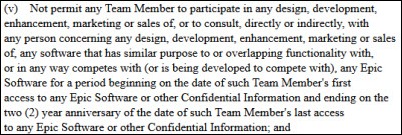Giving a patient medications in the ER, having them pop positive on a test, and then withholding further medications because…
Monday Morning Update 11/5/12
From The PACS Designer: “Re: iPad Mini. TPD told you about the iPad Mini awhile ago, but didn’’t expect its arrival until early next year. Now that it’s here, you will see a rapid deployment in the healthcare field. Healthcare IT departments need to be on alert as the expansion of iPad mini users will could quickly overload already busy networks.”
From Japandroid: “Re: MMRGlobal. I spent 30 minutes reading their press releases after your item and was floored. They crank out what seems like one per day, like the one mentioning that they shipped 25 more PHR licenses to a reseller (congratulations!) Check out their YouTube video – the company’s spokesperson is a former Playboy model, soft porn movie star, TV producer, and the trophy wife of company founder Robert Lorsch, who has a long list of business and philanthropic accomplishments.” Looks aside, Kira Reed is polished and engaging in the video, although not enough to make PHRs interesting (she says PHRs are “exploding,” which I would agree by my definition of “exploding.”) Vendors: is anybody planning to reward the company’s patent trolling by licensing its EHR-related intellectual property, which will be celebrating its one-week birthday in just a few days?
From Epic Pawn: “Re: Epic. The contract they sent me for the privilege of consulting with one of their clients will require me to end my HIT career!” Interesting points:
- Apparently a hospital can’t hire a consultant to help with Epic until that person signs a lengthy contract with Epic.
- If the consultant develops any kind of enhancement to Epic software and doesn’t sign over the rights to the hospital, the enhancement is automatically owned by Epic.
- You are obligated to report anyone you know who has accessed anything related to Epic without authorization, even if you didn’t have anything to do with their access.
- You can’t hire or contract with a former Epic employee until they’ve sat out a one-year waiting period.
- You can hire an Epic customer’s project team employee only if you don’t assign them any Epic-related work for two years, and they are considered to be a project team employee until three months after go-live.
- Your employees can’t perform any activities that compete with Epic – design, sales, consulting — for two years after they leave your employment.
- You agree that Epic is a third-party beneficiary of the agreement your employees must sign, which gives Epic a right to enforce the agreement even though those people don’t work for Epic.
- You agree that any legal actions will be heard in Wisconsin courts.
- I’m sure there’s more, but it’s a long read and I’m getting numb.
From Lambrusco: “Re: Allscripts. I think they’ll get a private equity deal announced by the earnings announcement on Thursday. Otherwise, they will have to put out an ‘exploring strategic alternatives’ addendum to the announcement if they miss on revenue or earnings (which is likely) to cushion any fall. Worse than allowing word of the PE deal to leak out was the MyWay announcement, which clued every potential PE buyer to dig more closely into attrition rates, which are sure to rise. They could have waited a month or two before putting a bullet in MyWay. The company is incredibly inefficient and the CEO was given carte blanche by the board to do M&A himself to buy his way out of trouble after avoiding tough product decisions in 2008 and 2010, so the cash flow and margins are probably understated and the PE guys can put in a management team that can execute. This week will be interesting.” Indeed it will.
From Coolmaker: “Re: vaccine refrigeration. They can make a zeer pot refrigerator that only requires water to function.” That might be an interesting project – a couple of flower pots and some sand and you can make a rudimentary refrigerator, although I don’t know if it will get cool enough to keep vaccines.
From Tarheel Ingenue: “Re: UNC Health Care CIO. Leaving.” Verified, apparently, based on an internal e-mail sent my way. Rose Ann Laureto, who’s been on the North Carolina job just a year, is moving to Promedica as CIO of the 11-hospital system that’s closer to her original home.
It’s pretty much all KLAS when providers use paid information sources to evaluate vendors according to my poll, although Gartner and “none of the above” had minimally respectable showings. New poll to your right: how much will patient empowerment and mobile apps change the healthcare system? After you’ve voted, click the Comments link on the poll to try to sway the undecided voters.
Instead of doing a “Listening” recommendation, Lt. Dan of HIStalk Mobile and I put together a Spotify playlist with some new and old stuff we’ve been following (our musical tastes overlap quite a bit). Spotify offers high-quality free streaming, so download it and you can play through the 39 tracks and three hours. Examples: new Neil Young, Wild Belle, Seapony, and older stuff from Frank Black, the BellRays, Public Enemy, and Operator. Feel free to create your own playlist and send me the link – if I like it, I’ll run it. If anyone seems to care, I’ll put out a new playlist every week or two, maybe focusing on specific genres.
Thanks to the following sponsors, new and renewing, that have recently supported HIStalk, HIStalk Mobile, and HIStalk Practice. Click a logo for more information.
SCI Solutions founder and industry long-timer John Holton retires from the company, although I’m betting (and hoping) he will pop back up in a healthcare-related role shortly since he’s a lifer who’s a bit young for the rocking chair. SCI’s remaining managing partners are Joel French (CEO) and Jeff Anderson (chief sales officer).
NYU Fertility Center, located in the evacuated building whose generator building that was evacuated after basement flooding shorted out the power to the generator’s fuel pump, saves its embryos and the carefully timed fertility cycles of its patients by running five-gallon cans of diesel fuel to the rooftop generator to buy time until the embryos could be moved to liquid nitrogen storage.
Here are the NYU nurses who bagged the NICU respirator babies while walking them down nine dark flights of stairs to ambulances waiting to take them to other hospitals, interviewed on 20/20 with some of the parents.
Another New York hospital closed indefinitely: the Manhattan VA Medical Center. NYU will open its practices Monday although some will be at different locations, while Bellevue says it will be down for at least two weeks. NYU has also shut down its medical school for the week and cancelled its applicant interviews.
A funny editorial in the St. Louis newspaper called “Talkin’ Colons with a Computer” observes that insurance companies use automated telemarketing for health reminders and asking health questions of their members. A sample:
A colonoscopy is not only an unpleasant procedure — a fact the voice failed to mention — but an expensive one. Hospitals don’t list their prices — no, that would make way too much sense — but independent cost-comparison websites suggest you can count on paying an average of $2,025 for a colonoscopy in St. Louis. The anesthesiologist will bill you separately. Why? Because he can. The facility may bill you separately. Why? Because it can. Also, if the colonoscopy actually finds a polyp or some other anomaly, it becomes a “diagnostic” procedure and not a “screening” procedure and it will cost you more. Why? Because it can. That $2,025 price applies if you have insurance. The voice was happy to suggest a colonoscopy because (a) voices don’t have colons to be scoped and (b) the insurance company would rather pay its share of the discounted price of the procedure than pay out hundreds of thousands of dollars for colon cancer treatment. Insurance companies have many faults, but stupidity is not one of them.

California state HIE overseer UC Davis releases HIE Ready, a buyer’s guide for providers interested in the interoperability capabilities of EHRs they are considering. It’s mostly a set of technical specs and an invitation for companies to participate.
Former shareholders of critical test reporting system vendor Vocada file suit against Nuance, which acquired the company and its Veriphy product in 2007, claiming Nuance has failed to make $7 million in earned payments. The shareholders say an arbitration panel has already unanimously ruled that Nuance fraudulently induced Vocada’s board and shareholders to agree to an acquisition whose terms included $20 million in cash or stock for shareholders, $4 million in cash or stock for employee retention and management bonuses, and $21 million in earnout consideration contingent on three-year revenue targets. An earlier Nuance SEC filing states that the financial targets were not met.
Is the iPad mini the killer form factor for medical professionals? #iPadmini #Epocrates
— Epocrates (@Epocrates) October 23, 2012
An Epocrates survey finds that one in three physicians plan to buy an iPad mini since it fits into a lab coat pocket.
The Raleigh, NC newspaper covers local EHR efforts. Tidbits:
- A local doctor who took the Allscripts MyWay plunge two years ago is not happy that it won’t be further enhanced. “We bought what we bought thinking it was a stable company and it was their newest package. You spend all this time transitioning to a program, and they come back and say, ‘Sorry guys, we’re not going to do this after Jan. 1.’” Allscripts has 1,200 employees in Raleigh, the home of the former Misys that it acquired.
- About 50 percent of NC doctors surveyed said EHRs haven’t improved care or aren’t worth the cost.
- WakeMed will spend $100 million on its EHR, while Duke’s Epic implementation will cost $500-700 million and will earn $50 million in HITECH incentive payments. UNC will choose a vendor this month to replace several hundred applications.




























I continue to marvel at those who rail against Epic’s practices. It is those practices that make it the most successful HIT vendor, especially when it comes to the best implementations. I don’t understand why controlling your supply chain is a bad thing. It used to be said that no CFO ever got fired by hiring a Big 8 firm. I think the same thing could be said for CIOs who hire Epic. I suspect its those outside the supply chain looking in, those who have zero real world experience with Epic or those who are Epic wannabes that make up most, if not all, of the Epic detractors on HISTalk. I have been doing Epic implementations for almost 15 years, both as a consultant and as a CIO, so I’m pretty sure I have a good understanding on the folks at Epic by now.
So what is new about the EPIC contract. It all about control and Judy is the queen of control. People can’t change jobs, but the CIO don’t support their employees when they want to leave, they support Judy! If the clients pushed back on the nonsense, then Judy would have to flex.
Also, you may want your readers to look at this from the MEDITECH newsletter, seems Haftey has a great business model, just hang onto the coattails of a vendor.https://www.meditech.com/magazine/pages/1112_implementationplan.htm . Just like MEDITECH did with DELL, JJ, et al, they want to tell their clients who they can play with. And that does not mean better outcomes, but more likely increased costs.
So to current and future clients of EPIC and MEDITECH, start to push back, and tell them you will decide what resources you will use, and support your employees in terms of where and what they can do in their careers.
People rail against Epic’s employment practices as well they should. I understand the necessity for non-compete clauses for high-level executives or maybe individuals in a very specific role (R&D) but Epic’s are incredibly broad-based and quite lengthy.
Wonder to what extent non-compete clauses are legally allowed per the WI state jurisdiction. Imagine it is pretty friendly if Epic wants all legal action to take place there.
I just looked at the MMR Global patents. What a joke. Save for the most recent patent, the three earlier ones all involve faxing or voice communications. That is, the provider faxes a patients record to a special fax number and the fax image is saved at a web server. I hope that that’s not what they’re trying to license. They’re going to get laughed out of the market.
The most recent one drops that limitation, inexplicably, but doesn’t seem to have any support in the specification for any other way to transfer records from the providers. My guess is that one is probably invalid.
About time Meditech… Is this a result of the 6.0 installs to date that ave not gone so well? “The New MEDITECH: We’re Delivering
A game-changing implementation strategy marks a major new direction for MEDITECH.”
Epic’s non-compete is laughable. In my opinion and that of counsel I have engaged, Epic runs the risk of not being able to enforce it because it is so over the top. When it comes to how to treat former employers or vendors, I have three golden rules that I abide by and tell my employees:
1. Don’t steal someone’s IP or confidential information. Epic may not have invented an EMR, but give them the respect of not taking their code, look and feel. Same for the details of how they run their business.
2. Don’t mess with another company’s customer or prospect list. This is an unwritten rule of business. If what we’re building is great, we don’t need to rely on our employee’s old rolodex to get it in the market.
3. Don’t pick off your old employer’s employees. If they come to us, fine, but we don’t need to raid another guy’s company.
There you have it. That is the reasonable businessperson’s litmus test on how to behave. Epic is not a reasonable businessperson, but they don’t keep me up at night because any judge would quickly see how asinine they can be in this regard.
I respect how Epic grew their business when they were a gazelle. I have less respect for how Epic maintains their position now that they are an elephant.
RE the colonoscopy editorial–speaking as a gastroenterologist, I c an say he’s right about the crazy-quilt cost issues. And the insurance company is wrong if they said colonoscopy is the only screening option–stool testing and virtual colonoscopy are reasonable as long as you have colonoscopy to back them up on positive findings. But in no way is the insurance company coming out ahead financially on future cancer care by recommending colonoscopies–if there is a payoff it comes mainly after age 65 (75% of the disease), so the lion’s share of any savings go to Medicare.
RE: Arkansas Dave
Your comment that “no CFO ever got fired by hiring a Big 8 firm” is completely incorrect in this case.
Look at the market and outcomes and you will see that CIOs are fired after implementing Epic far more than any of the other EHRs. Also hospitals have their bond ratings downgraded much more often, not a minor thing.
This is due to the “surprise” after go live when the ongoing cost is almost 2X that of one of the other vendor options.
Last time I checked, this is a free country. If an job candidate doesn’t like the Epic employment agreement, then they are free to work elsewhere.
this is directly from the meditech website…
“More Onsite Presence. Our application consultants will increase their onsite presence by perhaps as much as 95%, drastically reducing customer travel to MEDITECH.”
What this actually means is more of our underpaid and unqualified 22 year old application consultants will be spending more time at your hospital.
Same dog different fleas….
“EDS Says” – Your “Free Country posting” is ignorant of the law. Noncompete clauses are reviewed by courts for “reasonableness” in terms of scope of geography and restricted activity. A free country it might be, but noncompete / restrictive covenants still need to follow the law.
In last couple of years a few of the larger Healthcare IT Consulting Firms have been stung by breaching Epic non-compete clauses. One in particular to the tune of many thousands of dollars, the loss of Epic business for a number of months AND the individual they hired had to sit on the bench until his non-compete ended, earning a salary and full benefits. While the Epic clauses shouldn’t necessarily stand up in court – they seem to be – at least so far.
I had a really old contact with Epic and when I gave my notice the customer non-compete provision had long expired but Epic was clever enough to have set up a lot of secret no-hire agreements.
Now that I’m well past those restrictions Epic still agreements with their customers that limit when and where I can work. That’s true for anyone on an Epic project even if you’re *never* worked for Epic directly.
I’ve accepted that Judy and the rest of Epic’s leadership won’t be held accountable for this behavior but I will consider them crooks and thugs for the rest of my life and I will always resent being treated like one of their peasants.
@EDS – I think the point is, it’s not a free country when you work for Epic…. Given that they hire 22 yr olds straight out of college, glad to have their first decent-paying job, it’s not surprising employees sign on without fully understanding what they’ve signed. What’s surprising is that they treat their customers that way, and the customers by and large don’t fight back. Epic isn’t good enough software for a health system to allow itself to be pushed around, especially at the price involved. It’s sad statement on the industry as a whole.
Instead of focusing on their bullying and/or ability to uphold the contract, I would hope that readers would be interested in uncovering what Epic desperately needs to keep hidden.
I keep going back to the material question: Is a client’s employee who is leaving really going to harm Epic’s business? Are they really going to go out there an start the next great HIS system?
Some fraction of 1% probably have grand plans to somehow compete with Epic. The other 99.9% simply want to make a living.
I am confident that is how a District or Circuit judge would see the reasonableness (actually, the lack of it) with Epic’s agreements when someone has the where with all to challenge it.
In the past 2-3 years, Wisconsin courts have found overreaching employment agreements to be “vague, overbroad, not reasonably necessary to protect” the employer, and have deemed portions of those agreements unenforceable. Epic’s agreements are a court case waiting to happen.
Mark Laret, UCSF CEO, was a featured panelist at recent medtech conference (marquee health system execs, HIT enterpreneurs, investors) in San Francisco.
Given soap box opportunity when directly asked his impression of Epic, Mr. Laret’s reponse – in total – was that it was “sturdy but clunky”. This seems the most succint encapsulation of industry sentiment.